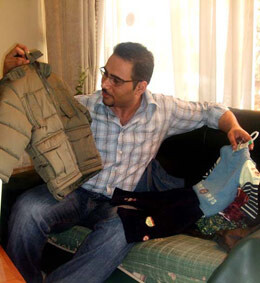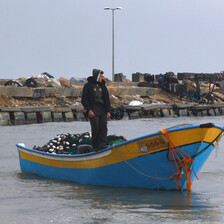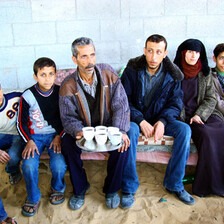Cyprus 12 November 2008

Muhannad al-Helo (Eva Bartlett)
Al-Helo smiled broadly as he held up the bag of clothes purchased in Cyprus that he is sending back to Gaza for his wife and their 18 month-old daughter. “Some of this is available in Gaza,” he said, cradling an adult running shoe, “but it is extremely expensive, as it has been brought in through the tunnels,” referring to the network of tunnels through which smugglers bring goods in from Egypt. He sorted through the articles: a dress for his baby, a belt for his wife, a warm winter coat for the girl, a pretty scarf for his wife.
In November 2007, al-Helo began the process of applying for a scholarship to do his master’s degree abroad. Having received his bachelor of arts in medicine in Yemen four years prior, he had since been living and working in Gaza. Trained as a medical doctor, he plans to continue studies in medical ethics, in a field of higher education now unavailable in the cut-off Strip. “I cannot pursue my master’s in Gaza, there are no options there,” he explained.
Nearly ten months following his application through Erasmus Mundus, a philanthropic association funded by the European Union, al-Helo learned he had been accepted and granted a full scholarship with all expenses paid to the Biomedical Ethics program on 26 August. The program is held in three European countries — Belgium, Holland, and Italy — over the course of nine months. His first place of study, the Katholieke Universiteit of Leuven, Belgium, required al-Helo to reach the country by 22 September, and before that, attaining the necessary visa. While he did manage to get a Schengen visa (covering 15 European member countries), requiring a four-week process of couriering his passport via international workers to the appropriate Jerusalem offices and back to Gaza. However, he learned that exiting Gaza was near impossible.
Al-Helo had worked for UNRWA, the UN agency for Palestine refugees, yet when he followed Israel’s procedures for applying for an exit permit, he was inexplicably denied. “ ‘You don’t have a permit,’” he said Israeli officials at the Erez checkpoint told him. “They never explained why, though.” Due to the Jewish holiday of Yom Kippur, al-Helo had to wait to re-apply for an exit permit.
“I applied again, about one or two weeks ago, and I was once more denied,” al-Helo explained as he packed for his trip from Cyprus to Belgium. “They again didn’t explain why my application was rejected. When I informed the Belgian university of my first rejection, I asked if they could please intervene on my behalf. They contacted the Belgian consulate in Israel, but in the end told me that they couldn’t interfere with the security of Israel.”
He turned to the Free Gaza Movement. “I really worked hard for the chance to leave with the boats returning to Cyprus,” he said.
“Initially, when I contacted Free Gaza, they told me that I didn’t have a visa for Cyprus and I wouldn’t be allowed to leave with the boats. But after checking with different consulate officials, we verified that the European Union permits anyone with a Schengen visa to receive a five-day transit visa for Cyprus,” he explained.
“I didn’t have any other options, this was my last hope,” said al-Helo.
“If I couldn’t leave this year, I would have had to re-apply to the university again next year. There was no guarantee that my admittance and scholarship this year would be re-awarded one year later.”
With no means of earning his master’s degree in Gaza, al-Helo was left with the option of not attaining the higher degree and simply working whatever position he could get in the beleaguered Strip.
“I would like to work as a researcher in biomedicine. It is an important field, and will be of great benefit, especially in Gaza, with so many chronic illnesses and the increasing prevalence of cancer,” said al-Helo.
Al Jazeera reporter Emir Mohammad recently visited the Gaza Strip, arriving on the third Free Gaza boat sailing from Cyprus. Mohammad reports that, according to aid workers in Gaza, al-Helo’s case is not unique. “There are currently more than 600 people who are considered priority medical cases who need to leave Gaza. Many of them already have visas for other countries. Some of them are living and working outside, but came to Gaza to visit and couldn’t leave. Many have lost their work outside.”
The Palestinian Centre for Human Rights corroborates this number, putting the figure between 600-700 urgent medical cases, with another 700 students who need to leave for study purposes.
Meanwhile, the Free Gaza Movement readied its fourth boat, which sailed on 7 November, this time carrying 13 European Members of Parliament among its distinguished passengers.
In their two successful trips, Free Gaza has brought a student, and a patient and his family from Gaza, all of whom had no way of exiting due to Israel’s closure of the borders. But one Free Gaza organizer, Greta Berlin, knows that the boats cannot be the main means for Palestinians to leave Gaza.
“It’s outrageous that more than one thousand medical patients and students cannot leave for study and for treatment unavailable in Gaza. We are doing what we can, but it’s frustrating to realize that we can only help a few at a time. Our intention has always been to bring the plight of the Palestinians to the world stage, in hopes that others would follow us and open up a continuous sea-route exit from Gaza, and that the land borders would be opened.”
Eva Bartlett is a Canadian human rights advocate and freelancer who spent eight months in 2007 living in West Bank communities and four months in Cairo and at the Rafah crossing.
Related Links





